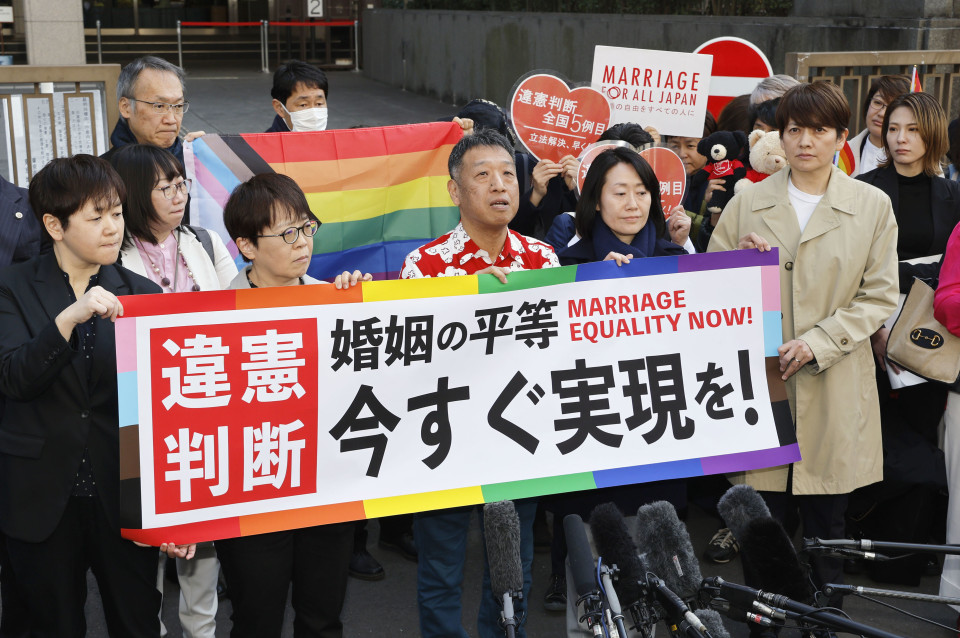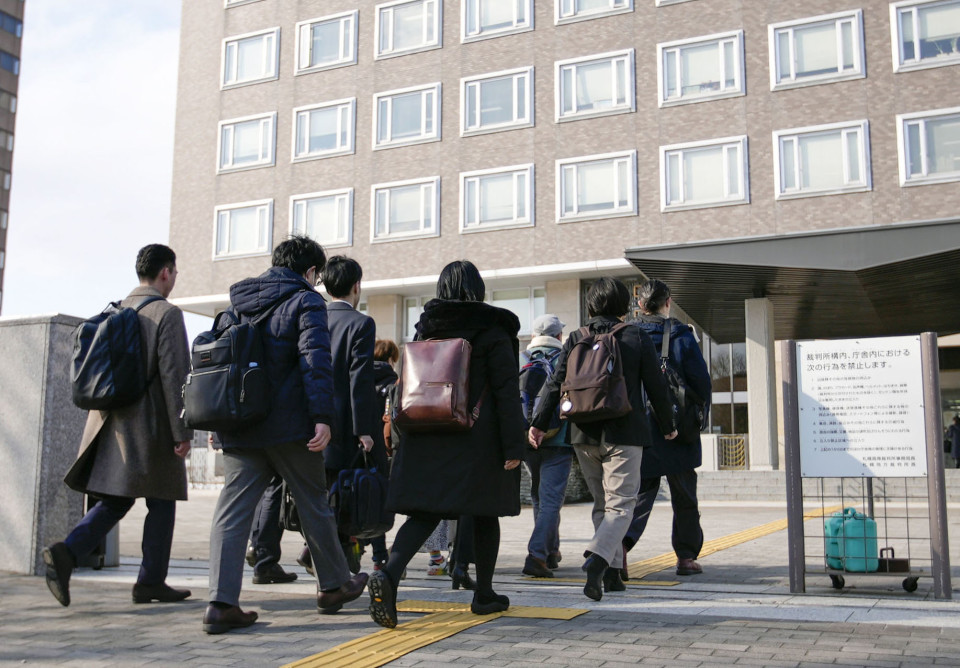A Japanese high court ruled Thursday the country's lack of legal recognition of same-sex marriage is unconstitutional, in a move likely to further mount pressure on the government to do more to protect sexual minorities.
The Sapporo High Court upheld the lower court's landmark verdict in 2021 that said non-recognition of same-sex marriage violates the right to equality protected under the Constitution but rejected a total of 6 million yen ($40,600) in damages sought by three same-sex couples in Hokkaido against the state for emotional distress.
The plaintiffs said they will appeal the ruling to the Supreme Court.
The ruling, the first by a high court among six lawsuits filed at five district courts questioning the current laws' unacceptance of same-sex marriage, said the provisions violate not only Article 14 on the right to equality but also Article 24, which says marriage shall be only on the mutual consent of "both sexes."

The court stated for the first time that Article 24 can be understood as also guaranteeing marriage between individuals of the same sexes.
The clause did not anticipate same-sex marriages when the Constitution was enacted but "it should be interpreted against the background where respect for individuals is more clearly considered," Presiding Judge Kiyofumi Saito said in handing down the ruling.
The ruling also said "there would be no disadvantage or harm" even if same-sex marriages are legalized, including in terms of social impact.
Feelings of discomfort or aversion toward same-sex marriages "are only due to sensuous, emotional reasons," the ruling said, adding those feelings could be resolved through promotion of public awareness about the unnecessity of treating same-sex couples differently.
Japan remains the only Group of Seven major industrialized country that has not legalized same-sex marriage or civil unions, despite growing pressure from the LGBT community and its supporters.
In the lawsuit, the government has argued that the Constitution presumes marriage is only between heterosexual couples.
In rejecting the plaintiffs' claims for damages, the court said, "It cannot be said that discussions at the Diet...regarding provisions not allowing same-sex marriage are clearly in violation of the Constitution."
One of the plaintiffs told a press conference in Sapporo that she was "encouraged by the forward-thinking" ruling.
At the district court level, courts have given different opinions regarding same-sex marriage, with Tokyo District Court becoming the latest to give a ruling on the issue earlier Thursday.

The Tokyo court said the lack of legal recognition of same-sex marriage in the country is in a state of unconstitutionality, reaching the same conclusion as Tokyo and Fukuoka district courts in 2022 and 2023, respectively.
Sapporo and Nagoya district courts have ruled that disallowing same-sex marriage was unconstitutional in 2021 and 2023, respectively, while the Osaka District Court said it was constitutional in 2022. Every court has dismissed compensation claims.
In the Tokyo District Court ruling Thursday, Presiding Judge Tomoyuki Tobisawa said the lack of legal arrangements similar to heterosexual marriages for same-sex couples was "a deprivation of a key part of their personal identity."
But Tobisawa concluded it did not amount to unconstitutionality at present, saying the Diet has "many options" to take action on the issue.
The eight plaintiffs, consisting of company employees and public servants in their 40s and 50s living in Tokyo, said legislative inaction on the matter has violated their rights and caused them emotional distress. They had sought 1 million yen each from the central government.
Japan's civil law and family registration law provisions are based on marriage between a man and a woman, and privileges resulting from matrimony, including inheritance rights, tax benefits and joint custody of children, are only granted to heterosexual couples.
Against that backdrop, an increasing number of municipalities have issued partnership certificates to make it easier for same-sex partners to enjoy some of the same public service benefits as heterosexual couples, although they are not legally binding.
Related coverage:
Japanese court approves nonsterilized trans man's gender change
FOCUS:Japan faces hurdle to changing law after transgender surgery decision
Japan's top court says surgery need for gender change unconstitutional










